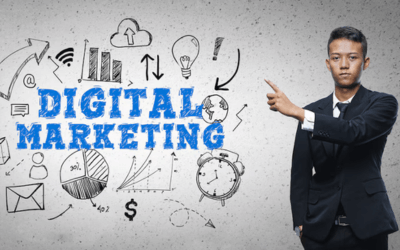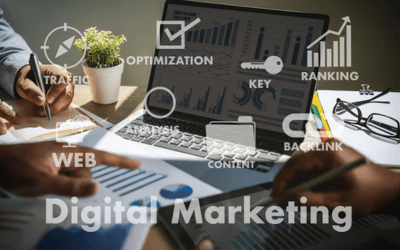Digital marketing needs no introduction. With all leading companies and brands relying on the internet and online platforms, this has become a common concept in the marketing world. It is a broad domain that includes multiple techniques and channels, such as emails, social media, websites, etc.
Many people use social media and digital marketing as synonyms, assuming they are identical. Although both marketing strategies share standard tools and platforms, they are distinct. Marketing professionals use them simultaneously to promote their marketing initiatives and efforts.
What is digital marketing?
Digital marketing refers to promoting products, services and brands through digital channels and platforms. Marketers and businesses use digital platforms and media to customize their marketing strategies to promote brand awareness among target audiences. They build influential relationships with consumers using the Internet and digital marketing, including emails, social media, websites, SMS, etc.
Companies use multiple digital marketing strategies to reach a global audience and sell their products at once, such as affiliate marketing, PPC, SEO, email marketing, content marketing, e-commerce marketing, and more. . As we compare social media and digital marketing, you need to know that the latter is an umbrella term that encompasses the former.
Types of Digital Marketing
It’s also essential to learn the differences between social media marketing and digital marketing. A successful strategy includes the following tactics, which you can adapt to suit your needs.
- Search engine optimization
- Content Marketing
- Social media marketing
- Email marketing
- Affiliate marketing
- Mobile Marketing
- Influencer Marketing
- Pay Per Click (PPC)
- We have explained some of these strategies in the following section.

1.Search engine optimization
It includes keyword research and content optimization so that the website ranks high on the Google search engine results page and other search engines. Those who want to master this field should take the best online SEO course.
2.Content Marketing
This refers to strategizing and creating on-page and off-page content to reach target audiences and increase website traffic.
3.Social Media Marketing (SMM)
Social media marketing involves building communities and engaging customers on social media channels like Instagram, Facebook, Twitter, and LinkedIn.
4.Pay Per Click (PPC)
PPC is a paid advertising strategy where brands pay search engines or publishers a fee every time a user clicks on their ads.
5.Email Marketing
This means connecting with leads by emailing them about the latest events, offers, deals, and blogs. A free email marketing course can help you become skilled in this field.
Benefits
Let’s take a look at some of the benefits of digital marketing:
1.Specific targeting and global reach
Digital marketing allows you to target specific audience segments based on age, location, behaviour, interests and other factors. In addition, it is an effective way to reach people worldwide through various channels and mediums, such as websites, social media, blogs and emails.
2.Increased customer engagement
This builds brand loyalty and creates awareness of the brand or product.
3.Measurable results
You can track, evaluate and measure the results of marketing campaigns using real-time data. You can adjust budgets, track the effectiveness of your campaigns, make improvements, and make data-driven decisions.
4.Flexibility
Since consists of various channels and strategies, such as email marketing, SEO, content marketing, PPC, etc., businesses can tailor their approach to meet specific goals and needs
5.Cost-effective method
Marketing is more cost-effective and cheaper than traditional marketing methods. Even small companies and startups can compete with big brands using different online marketing strategies.
Disadvantages
The following pitfalls will help you learn more about the difference between social media and digital marketing.
1.Fierce Competition
must constantly upgrade and adapt their strategies to stay ahead of competitors.
2.The ever-evolving landscape
The industry changes daily. What was done yesterday will have different results today. Therefore, you must stay on your toes and invest time and effort constantly learning and upgrading.

3.Great options
Choosing the right one that works for your brand can be difficult and requires trial and error.
4.Limited personalization
Sometimes be limited in personalization and incorporating the human touch.
5. Ad blockers
Customers often use ad blockers or skip ads, limiting the effectiveness of paid advertising and marketing efforts.
What is social media marketing?
Now that you have an insight into digital marketing, it’s time to familiarize yourself with social media marketing.
It promotes products or services, engages with followers, reaches more customers, and launches advertising campaigns through social media platforms.
Companies use Facebook, Instagram, Twitter, LinkedIn and other channels to inform target customers about the latest events, post stories, photos, or videos, interact with customers via live chat, and Q&A. used to conduct sessions. All these activities aim to attract more people and create a distinct space for your brand.
As social media becomes more easily accessible to more people, businesses are using this channel to promote their products, brands, and content. However, they must develop fun and out-of-the-box ideas for their posts and content. Designing well-planned social media strategies demands more time and effort.
There are two ways to advertise products or services on social media:
The first is to grow followers, connections and fans by posting valuable and engaging content, videos, contests and stories on social media.
Another way is to use paid advertising, such as Google Ads and Facebook Ads, to target specific audiences.
Another point to note in social media marketing vs digital marketing is how the two work. The following points explain the social media marketing process.
Identification of target customers
- Setting marketing goals
- Choosing platforms for campaigns
- Creating posts and content
- Scheduling posts
- Running and optimizing campaigns
- Interact with the audience through comments and posts
- You can become a pro in this field with an online social media marketing course.
Types of Social Media Marketing
As we mentioned, social media is a part of digital marketing. However, many companies treat it as a separate marketing area, and the team follows best practices to run successful campaigns. Here, we have discussed various elements of social media marketing strategies:
- Influencer Marketing
- Campaign Management
- Customer engagement
- Organic and paid marketing
- Social media contests
- Social media management
- Live and Q&A sessions
- Content Marketing
- We have explained some social media marketing tactics below to help you understand social media marketing’s differences from traditional marketing.
1.Influencer Marketing
This includes promoting the brand by hiring influencers or celebrities with substantial social media followings. These people endorse your products to create awareness, increase customer engagement, and increase sales.
2.Social media advertising
It is a paid marketing method where companies run paid advertisements on various channels.
3.Social media management
This includes developing strategies, creating content, analyzing target audiences, collaborating with influencers, monitoring online mentions and interactions, interacting with customers, and measuring results.
4.Content Marketing
Social media marketers are also responsible for creating graphics, images, videos, texts, and e-books and distributing them across various channels.
Benefits of Social Media Marketing
1.Spread the message quickly.
With a large fan base and following, your single post or message can reach thousands of users worldwide in a day or two. You can make announcements or send messages to people faster.
2.Brand awareness
Businesses can build brand awareness and reach more people by regularly interacting with consumers and sharing relevant content.
3.Targeted Advertising
You can use advanced targeting options to reach audiences based on their interests, demographics, location, and other factors.
4.Trend
With billions of social media users, you must recognize this channel to stay connected with potential customers and know what’s happening in the industry.
5.Customer Engagement
You get a platform to engage with customers and build strong relationships directly, resulting in customer loyalty and retention.
6.Supports SEO efforts.
Social media indirectly boosts your SEO efforts by driving traffic to your website.
7.Cost-effective method
When we compare digital marketing with social media marketing, both have one thing in common. Both are budget-friendly marketing strategies. Therefore, even small businesses can reach a large audience without straining their budget.
8.Direct customer interaction
Brands use social media to communicate directly with their customers through messages, comments, live and Q&A sessions, contests, voting, etc.
Disadvantages of Social Media Marketing
1.Demands continuous effort.
Social media marketers must regularly create and post engaging content on their channels to connect with consumers and grow their followers.
2.Quick changes in trends
We don’t need to explain how fast social media trends change. Therefore, marketers should stay updated with the latest events and happenings and post accordingly.
3.Limited control
Because social media channels are third-party platforms, businesses have no control over changing algorithms and policies.
4.Social media skills required.
You need a skilled professional to run paid ads on social media and generate desired results.
5.Social media negativity
We’ve all seen how a single post or piece of content can create negative impressions and affect a brand’s reputation. Therefore, marketers must always be careful when creating posts to avoid any negative publicity.
6.Spending time
Curating social media content, responding to all comments and messages, engaging with audiences through live chats, and monitoring metrics take constant time and effort.
Digital Marketing vs Social Media Marketing
Digital marketing is a broader concept that includes social media marketing. Although the two marketing strategies aim to engage the target audience and increase conversions, they differ.
Parameters Digital Marketing Social Media Marketing
Marketing Channels Digital marketing uses emails, social media, websites, and other platforms. Social media marketing channels include Twitter, Instagram, Facebook, WhatsApp, LinkedIn, and Facebook.
Key Aspects Banners, content, images, and videos are vital in promoting products or services. Content plays a crucial role in social media marketing.
Factors Affecting Success The success of digital marketing strategies depends on banner advertisements across different digital platforms. The success of social media marketing tactics depends on posting new and innovative content regularly across various social media channels to interact with the audience and engage them with the brand.
Audience Engagement Audience engagement is based on blog posts, website visits, social media platforms, and emails. Audience engagement depends only on social media platforms.
SEO, email marketing, SMM, content marketing, affiliate marketing, and PPC are common digital marketing strategies. Social media marketing strategies include blog posts, videos, images, carousels, and podcasts.
Goal: Digital marketing aims to acquire new customers, drive traffic to the website, create brand awareness, and increase conversions. The main goal of social media marketing is to drive traffic to the website, generate leads, and increase sales.
Results
could be faster. Results vary according to users’ likes, shares, and comments.
Cost-effectiveness: As it uses advanced and emerging technologies, it can be expensive for small businesses. Social media platforms allow marketers and small companies to post content without shelling out a penny
Conclusion
There is no denying that social media is one of the most popular and powerful marketing tools for interacting with the target audience and promoting brands across multiple channels. However, digital marketing includes other components that are as effective as social media marketing. Companies rely on various digital marketing methods and techniques, such as SEO, email marketing, affiliate marketing, PPC, content marketing, etc., to drive traffic, build brand awareness, and increase conversions.
What strategy works for you depends on your brand, target customers, and industry trends. Other forms of digital marketing can be more appropriate and effective for your business, but it’s always recommended to include social media in promotional campaigns to reach wider audiences.
To become a proficient digital marketer, join the complete digital marketing course.

